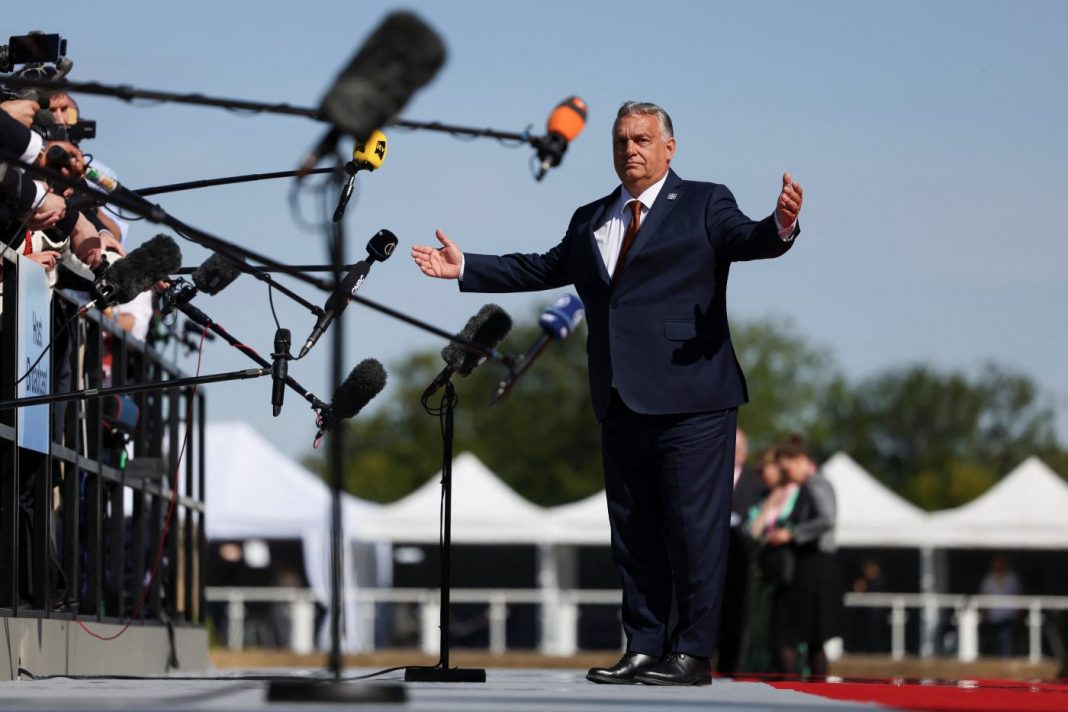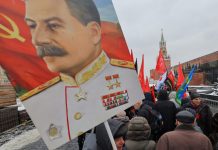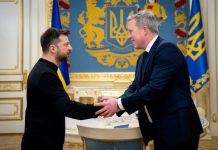By Dorka Takácsy, for CEPA
Hungarian Prime Minister Viktor Orbán’s performative diplomacy is aiding the Kremlin’s anti-Western propaganda.
Orbán managed to do two favors for Moscow in the run-up to the NATO Summit in Washington earlier in July, and the Kremlin’s propaganda machine exploited both to promote their narratives to domestic and international audiences.
His surprise visit to Moscow to meet Vladimir Putin before the summit was live-streamed on Ria Novosty, the Russian state news agency, in an unprecedented step for a Western leader’s meeting with the Russian president.
The media coverage sought to transmit the message that Putin is not an isolated pariah, but a great leader treated with respect. This was achieved by describing Orbán as the representative of the European Union (EU), and by emphasizing his expressions of gratitude for being granted time with the Russian leader.
The coverage of the Putin-Orbán meeting showed a calm and friendly atmosphere, with the two leaders reflecting on how difficult it now is to find countries able to talk with both sides.
These words perfectly fit Moscow’s narrative that the West’s actions are dictated by irrational sentiment, which is defined by Russophobia, and not by moral convictions, and were used by Kremlin propaganda channels accordingly.
Orbán was portrayed as an EU representative, as Hungary currently holds the rotating presidency of the bloc’s Council. However, he did not have any mandate from the EU and had gone to Moscow unannounced. The truth was that Orbán had no EU mandate at all, as Charles Michel, the chair of the European Council said when he rebuked the Hungarian leader on July 16.
This condemnation was widely quoted across the Russian media alongside the coverage of Orbán’s visit and used to show that the EU is divided and weak.
Orbán was not done. He also wrote an opinion piece which was published in Newsweek on the eve of the alliance summit. This harshly criticized NATO, regurgitating the often-used Russian propaganda claim that the alliance wants conflict. “Today, instead of peace, the agenda is the pursuit of war; instead of defense it is an offense,” he wrote.
While the article did not receive particular attention in the West, it gained immense traction in Russia. Within a day, it had generated more than 800 references across Russian language news sites, and all major Russian propaganda outlets extensively referred to it.
To put it in context, this is much higher than Hungary’s usual coverage in Russian-language media, even taking account of the growing attention given to Hungary in Kremlin-friendly outlets in the past two years.
Russian propaganda increasingly pays attention to its Hungarian counterpart, reports international events using Hungarian pro-government material, and even amplifies entirely fabricated stories.
This cooperation is smooth because the two propaganda apparatuses work with largely overlapping images of their adversaries: the US, the EU, and Ukraine among others. Major Russian news outlets approvingly quote Orbán when he criticizes the West, as he regularly does, repeating the anti-Brussels, anti-George Soros campaigns he has pursued for more than 10 years.
Orbán’s criticism of the West is useful for the Kremlin’s propagandists because, even though his lines are a little different from their own narratives, hearing them from someone within the EU and NATO adds an air of credibility.
To hear that NATO is a warmongering alliance from a member country’s prime minister (Orbán told Hungarian radio that “NATO, instead of protecting us, is dragging us as a member state into a world war”) has a greater impact than hearing it from the usual Kremlin talking heads. To see a Western leader, whether he has a mandate or not, parading as the representative of the bloc as he breaks ranks on the isolation of Russia is something the Kremlin is very grateful for.
Russian propaganda outlets do not only exploit such deeds to convey anti-Western propaganda for Russian domestic audiences but also worldwide, from Latin America to Africa.
One of the key elements that give strength to the West’s system of alliances is soft power, which effectively boils down to reputation. The reputation of strong allies, acting with unity, then sticking to mutually agreed stances, is a pillar of deterrence too.
Systematically undermining the alliance system’s image in the eyes of competitors and challengers, as Orbán is doing, erodes that deterrence.
By Dorka Takácsy, for CEPA
Dorka Takácsy is a researcher, focusing on disinformation and propaganda in Central-Eastern Europe and Russia. She is a visiting fellow of the German Marshall Fund of the United States and a research fellow at the Centre for Euro-Atlantic Integration and Democracy. She is also pursuing a PhD at the Corvinus University of Budapest, researching Russian domestic disinformation about the West.
Europe’s Edge is CEPA’s online journal covering critical topics on the foreign policy docket across Europe and North America. All opinions are those of the author and do not necessarily represent the position or views of the institutions they represent or the Center for European Policy Analysis.





